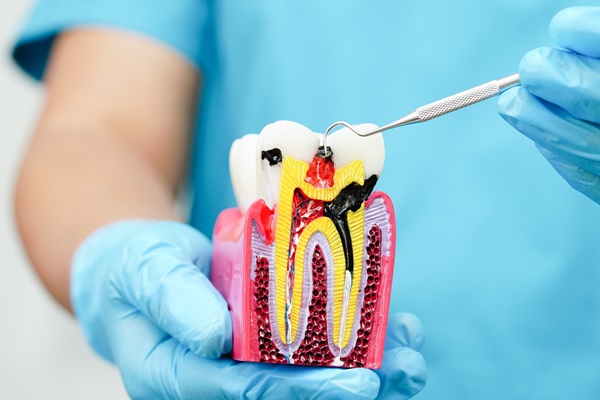Root Canal Therapy: What Are the Dangers of an Untreated Tooth Infection?

While a tooth infection can be uncomfortable and even dangerous, many people choose to live with the pain because they fear the speculative discomfort of a root canal. However, many report these procedures are pain-free, and moreover important. A tooth infection should not be left to fester, or else it can present significant health risks to patients.
Potential dangers of an untreated tooth infection
The dangers related to an untreated tooth infection may depend on the severity and resilience of the bacteria. Even minor infections can evolve, becoming more severe over time.
Pain and swelling
The first sign a patient is likely to notice is pain and swelling of the gumline. While tooth infections typically develop in the root and nerve tissue of a tooth, the bacteria can seep out into the surrounding gumline, causing redness and swelling.
Bone loss
If an infection is left to develop, it can begin to erode the bone structure around the nerves of the tooth, making the area more sensitive. Additionally, in extreme cases, the bacteria can spread to the jawbone, causing further loss and discomfort.
Tooth loss
As the bone wears away, teeth can become loose and fall out. While the initial infection may only result in a single lost tooth, if left untreated, the infection can cause more significant loss.
Sepsis
In the most extreme untreated cases, an infection can lead to a life-threatening condition known as sepsis. While some falsely think of this disorder as blood poisoning, sepsis actually refers to the body’s response to harmful bacteria in its tissues or bloodstream, and it may result in death if not treated quickly.
Dentists to the rescue
To reduce the risk of a tooth infection, patients should request a dental exam at the first sign of pain and swelling. If a dentist finds that an infection is the most likely cause of a patient’s discomfort, then the treatment may be a root canal, which involves several steps:
- X-ray: The dentist or endodontist takes an X-ray to determine the extent of the infection and to see the shape of the roots.
- Anesthesia: While not always used because the nerves are typically dead in the affected tooth, some dentist provide a local anesthetic to make the patient more comfortable.
- Access hole: To remove the nerve tissue and tooth pulp, a small access hole is drilled into the tooth.
- Cleaning: Small files of increasing diameter are used to remove, clean and scrub the canals of the infected material. Periodically, the dentist flushes the tooth and surrounding area to remove any remnants of the infection.
- Sealing: Once the infection is removed, the dentist or endodontist seals the tooth to prevent further infection.
Conclusion
A tooth infection does not have to become life-threatening, but it can if left untreated. While many people have heard the false narrative that a root canal is painful, it can be a potentially life-saving procedure, as well as an effective way to end the discomfort of an infected tooth.
Request an appointment here: https://www.sheats-endo.com or call Sheats Endodontic Group at (615) 526-2495 for an appointment in our Nashville office.
Recent Posts
An endodontist is the right dentist to see when you have tooth pain. This person focuses on the diagnosis, treatment, and prevention of infections. A root canal is the most common procedure that endodontists perform to repair and save teeth. It is helpful to understand the background of these dentists. Their training helps them to…
In many cases, root canal recovery is even simpler than the procedure itself. Patients who are nervous about their upcoming procedure have nothing to fear, as they will be able to return to their normal lives afterward. A root canal is an essential procedure that entails saving a patient’s tooth and keeping it functional over…
A broken tooth is typically something that you will want to have addressed immediately. While not every break in a tooth is considered an emergency, most of the time, it is ideal to take action as soon as possible. The type of break in the tooth will likely determine the necessary action. However, in order…
Endodontics is derived from the Greek words "endos" which means within, and "odont," meaning tooth. This dental discipline centers on the study and treatment of the tooth pulp as well as tissues around the root of the teeth. The most common treatment in endodontics is root canal treatment, which is often associated with pain. However,…


